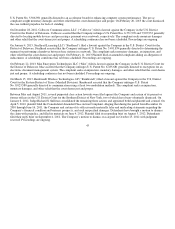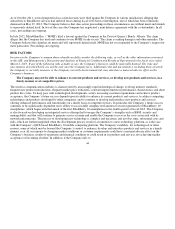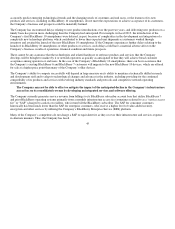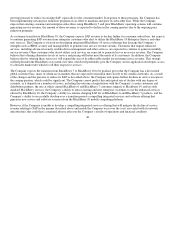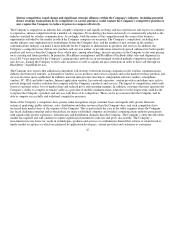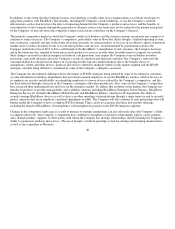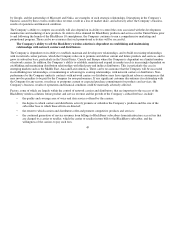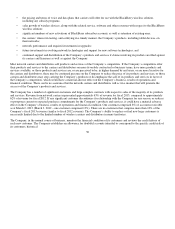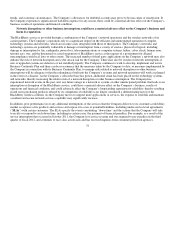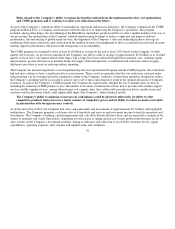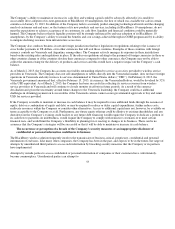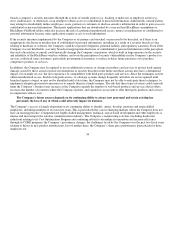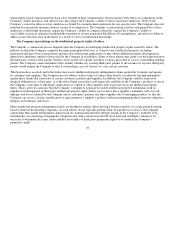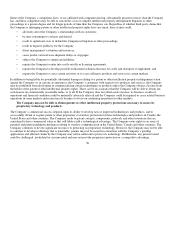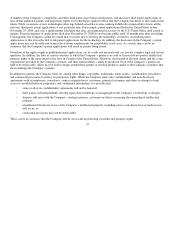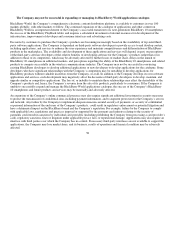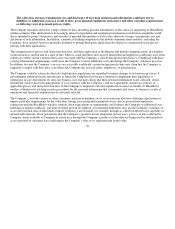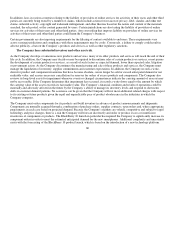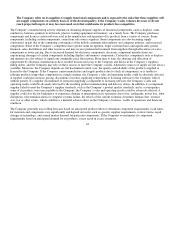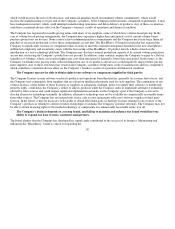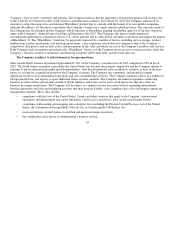Blackberry 2013 Annual Report Download - page 60
Download and view the complete annual report
Please find page 60 of the 2013 Blackberry annual report below. You can navigate through the pages in the report by either clicking on the pages listed below, or by using the keyword search tool below to find specific information within the annual report.
The Company’s ability to maintain or increase its cash flow and working capital could be adversely affected if it is unable to
successfully drive adoption of its next-generation of BlackBerry 10 smartphones, the first of which was available for sale in certain
countries on January 31, 2013. In addition, if the Company fails to accurately predict emerging technological trends and the changing
needs of customers and end users, or the features of its new products and services, including its BlackBerry 10 smartphones, do not
meet the expectations or achieve acceptance of its customers, its cash flow, liquidity and financial condition could be materially
harmed. The Company believes that its liquidity position will be strongly influenced by end user adoption of its BlackBerry 10
smartphones, by the Company’s ability to sustain the benefits and cost savings achieved through its CORE program and by its ability
to mitigate declining revenues from infrastructure access fees.
The Company also conducts business in certain foreign jurisdictions that have legislation or regulations relating to the issuance of
cross border payments in US dollars, or in other currencies that will exit those countries. Examples of these countries with foreign
currency controls are Venezuela and Argentina, among others. The Company actively manages its exposure in these jurisdictions
based on the existing rules and regulations in place. If the rules or regulations relating to the payment of foreign currencies in these or
other countries change or if the countries devalue their currencies compared to other currencies, the Company may not be able to
collect the amounts owing for the delivery of products and services and this would have a negative impact on the Company’s cash
balance.
As of March 2, 2013, the Company has accounts receivables outstanding related to service access fees provided to wireless service
providers in Venezuela. The Company does not sell smartphones or tablets directly into the Venezuelan market, does not have foreign
operations in Venezuela and only invoices its services denominated in United States dollars (“USD”). On February 8, 2013, the
Venezuela government announced that, effective February 13, 2013, its currency, the Venezuelan Bolivar, would be devalued by 32%
of the USD equivalent. As of March 2, 2013, the Company has been successful in collecting its service revenues from wireless
service providers in Venezuela and will continue to closely monitor its efforts in future periods. As a result of the currency
devaluation and given the uncertainty around future changes to the Venezuela leadership, the Company could face additional
challenges in obtaining payment on its receivables if the Venezuela carriers cannot secure governmental approvals to buy and remit
USD for services provided.
If the Company is unable to maintain or increase its cash balance it may be required to raise additional funds through the issuance of
equity, debt or a combination of equity and debt, or may be required to reduce or delay capital expenditures, further reduce costs,
reallocate resources within the Company or consider other alternatives. Access to additional capital may not, however, be available on
terms acceptable to the Company or at all. Furthermore, any future equity offering could be dilutive to existing shareholders and any
drawdown on the Company’s existing credit facility or any future debt financing would require the Company to dedicate a portion of
its cash flow to payments on indebtedness, would require the Company to comply with restrictive covenants or to meet certain
financial tests, and would limit the Company’s flexibility in planning for or reacting to changes in its business. There can be no
assurance that the Company’s strategies will be successful or that it will be able to maintain or increase its cash balance.
The occurrence or perception of a breach of the Company’s security measures or an inappropriate disclosure of
confidential or personal information could harm its business.
The BlackBerry wireless solution frequently involves the transmission of business-critical, proprietary, confidential and personal
information of end users. Like many other companies, the Company has been in the past, and expects to be in the future, the target of
attempts by unauthorized third parties to access such information by breaching security measures that the Company or its partners
have implemented.
Attempts by outside parties to access confidential or personal information of companies or their customers have, unfortunately,
become commonplace. Unauthorized parties can attempt to
53


